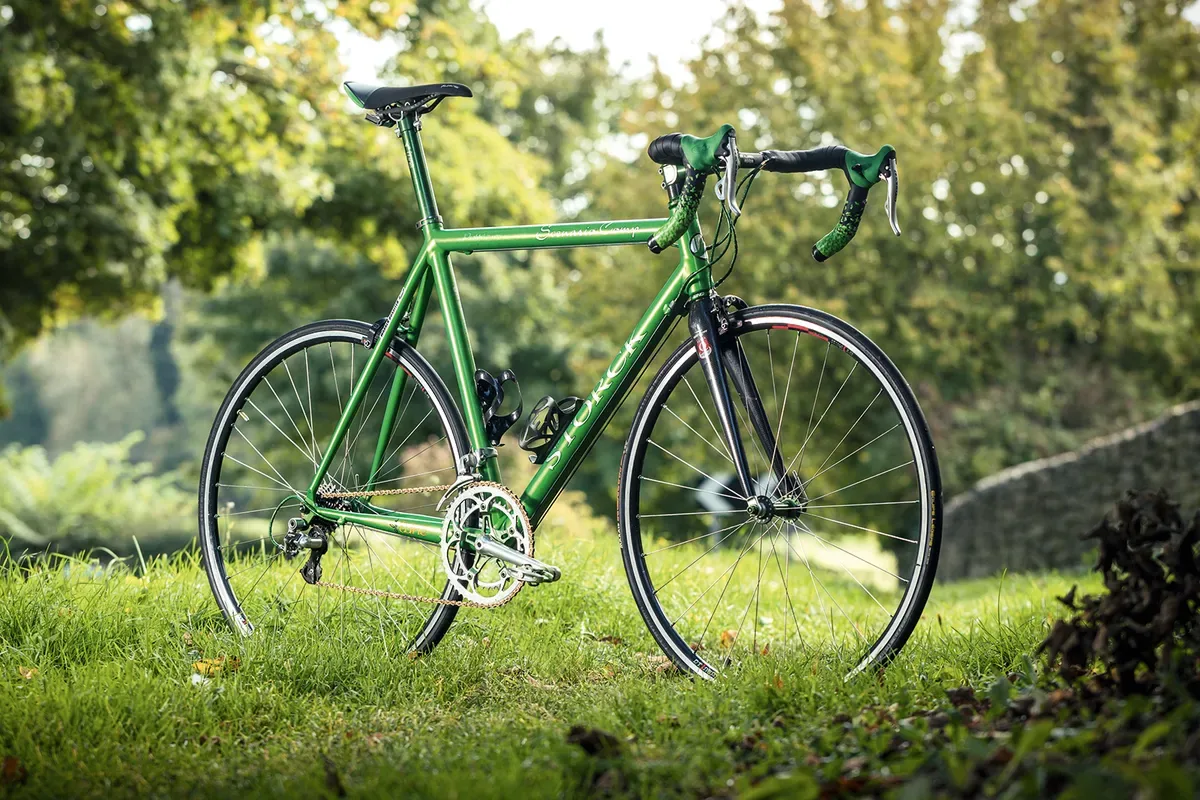The whole ‘save the rim brake’ thing is getting so old. Drop down into the comments of any lightweight modern road bike we test, and you’ll see someone pipe up about a bike they have, or had, that’s lighter and somehow therefore better than the one that has just won the Tour at record-breaking pace.
Okay, we know high-performance rim brake bikes are an appealing subject. We even published a story on rim brake bikes you can still buy. But I guess it’s like a film website publishing a list of films you can still get on VHS.
Bikes and wheels are now designed with cutting-edge aerodynamics, freed from the constraints that rim brakes put on design. These constraints include narrow rims that had to have a flat brake surface – limiting aerodynamics, limited tyre sizing and baggy cable routing.
Yet the argument that, somehow, an older road bike with rim brakes, which has a low weight, is therefore better, just doesn’t hold up to scrutiny.
The improved braking performance of disc brakes barely comes with a significant weight penalty anymore. Look at this year's Grand Tours. Pogaçar’s raw carbon Colnago Y1Rs from the Tour de France weighed roughly 7kg. And the new Cervélo R5, which Pauline Ferrand–Prévot used to win the Tour de France Femmes avec Zwift, is available in complete builds as low as 5.97kg.
The ‘save the rim brake’ crowd seem to focus on how good these brakes once were rather than how bad they are compared to disc brakes. Sure, rim brakes worked well on alloy rims and were easy to maintain. But on carbon rims? I’ll come back to that.
I own too many bikes

I was inspired to write this while organising my stupidly overstocked garage this week. I was in there digging out an old mountain bike for an upcoming out-there gravel conversion idea.
As I was going through my stable of bikes, moving some road bikes out of the way, I thought I’d give a couple a run-out.
My old classic Storck Scenario, with its featherweight DT Swiss/Tune hand-built wheels (made by the legendary Harry Rowland), epitomised everything good about rim brakes. It has solid braking performance and lots of feel from the weight-weenie favourite Zero Gravity calipers – and it is seriously light.
But the slender alloy rims can’t fit modern road bike tyres and those calipers struggle to accept anything bigger than 25mm. I can squeeze a 28mm in, just, but only if it's dry and there’s no risk of mud or debris clogging things up.
Alloy rims and rim braking are excellent, although it's sacrificial. The more you ride, the more wear you put into the rims. I’d rather replace a disc rotor than a rim.
Lighter doesn’t mean better

After riding the Storck, I went out on another favourite of mine, my original Parlee Z-Zero. It’s perhaps the ultimate rim-brake road bike. It’s feathery light (in its lightest iteration, I had it down to just under 6kg for a 58cm bike), super-stiff and absolutely gorgeous.
It's rolling on a set of Zipp 404 NSW wheels (although I also have a set of super-light Zipp 202 carbons for it). Here, however, it gets more problematic. The braking is good, but only just.
Back in the 2010s, Zipp pretty much had the best rim-brake performance on carbon rims thanks to their machined and textured brake surface. ENVE had similar, and Mavic tried lots of tricks, too.
While better than the rest, once those rims warm, they screech. It’s not the noise you get from a wet disc rotor, but something higher-pitched, more visceral. More traffic-stopping. In the wet, they honk like an angry goose.
At the same time as I’ve been riding these historic bikes from my collection, I’ve been testing some lower-priced alloy gravel bikes from Boardman and Focus. Both have the lowest tier of Shimano’s hydraulic disc offerings, and both are leagues ahead of the braking on both of my classic rim-braked bikes.
Rim brakes and carbon never mixed

I can be as rose-tinted-glasses-wearing as the most ardent rim-brake devotee, but the simple fact is rim brakes are inferior to discs when it comes to braking.
Yes, you can build a sub-4kg rim-brake bike that’s wonderful for weight weenies – and I admire your resolve to do so. After all, these bikes are amazing for a hill climb.
But rim brakes can be terrifying and downright dangerous on descents. If you’ve ever had a carbon rim delaminate on a descent thanks to overheating (I have), or had a tyre blowout or tubular tyre roll off because of heat build-up, you’ll know what I mean.
Look up Lance Armstrong’s field-crossing antics to avoid Joseba Beloki’s devastating crash at the 2003 Tour de France. The Basque rider rolled a tub after melting the tyre glue on a descent. He never got back to his previous best after that crash.
Such accidents haven’t deterred people in the past. An ex-pro once argued to me that the benefit of rim brakes was that if he buckled a wheel mid-race, he could flick the quick-release on his brake caliper to stop the pads rubbing. I thought it was weird that the advantage of rim brakes was the ability to make them worse, or even turn them off.
Disc brakes changed bike design for the better

Ultimately, people should look at what the disc brake has given road riding. We can now run bigger tyres, bringing less rolling resistance, more comfort and more grip.
Disc brakes have also enabled engineers and designers to create some seriously fast wheelsets, and to improve aerodynamics on all types of road bikes.
I’d even argue that without the disc brake, we wouldn’t have seen one of the most exciting and progressive areas of two-wheeled design, gravel bikes.
Rim brakes, I love you, but your time has passed

Rim brakes, like the crash gearbox, semaphore indicators and wooden-spoked wheels, belong in a museum of transport, not on modes of transport. They first appeared in the 1890s, and I’m sure Queen Victoria would have been impressed.
Yes, I admit, disc brakes are more complex, and they take more time and knowledge to maintain properly. And I won’t give my beloved rim-braked classic bikes away – I’ve got too many good memories to do that, and I will still ride them on occasion.
However, I won’t champion old tech as still being relevant.
Rim brake bikes are a curio now, like owning a classic car or motorbike. Enjoy them for what they are, but please don’t tell me they are a viable performance alternative to the brilliant bikes we have now.





